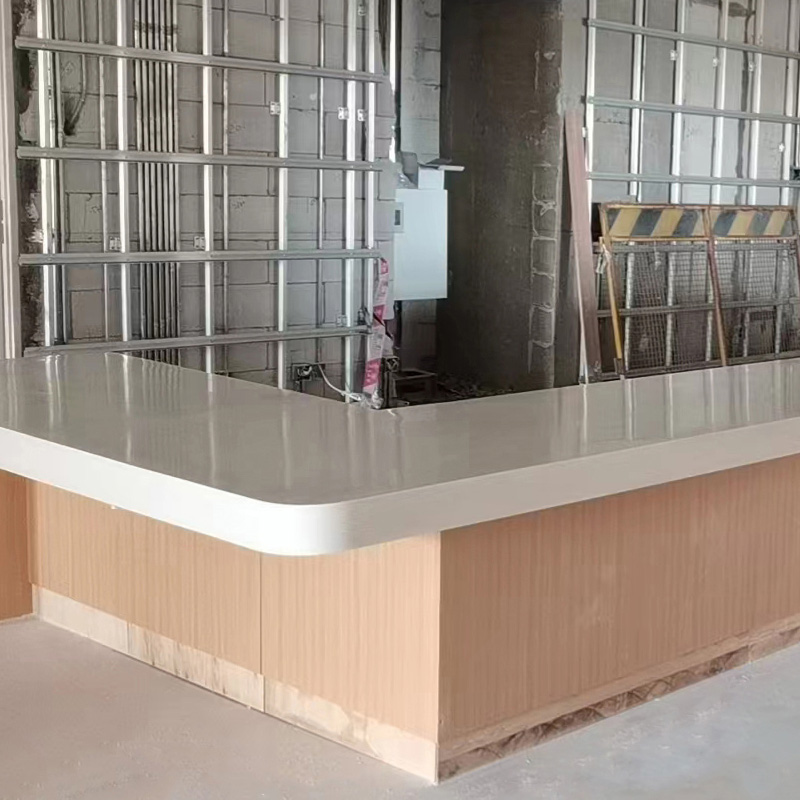
Artificial Stone reception desks are premium furniture pieces crafted from engineered stone materials, primarily composed of 93% natural quartz or other mineral aggregates bound with 7% polymer resins. These surfaces offer the aesthetic appeal of natural stone while providing enhanced durability and design flexibility. The material undergoes a manufacturing process involving high-pressure compaction (up to 100 tons) and vibro-compression at temperatures reaching 120°C (248°F), resulting in a non-porous surface with a Mohs hardness rating of 7 (comparable to granite).
Durability: Withstands impact resistance of 10-12 MPa and compressive strength exceeding 50 MPa, making it resistant to chips and cracks
Stain Resistance: Non-porous surface (water absorption rate <0.02%) prevents liquid penetration
Heat Resistance: Can tolerate temperatures up to 150°C (302°F) without damage
UV Stability: Colorfast properties maintain appearance with ΔE <3 color shift after 1000 hours of accelerated weathering
Hygienic Surface: Bacterial growth reduction of 99.9% due to antimicrobial properties
Design Flexibility: Available in over 200 color variations with consistent patterning

The superior technical specifications of Artificial Stone reception desks make them ideal for various commercial environments:
In high-traffic corporate lobbies, artificial stone desks maintain their appearance despite 500+ daily interactions. The material's scratch resistance (7H pencil hardness) prevents damage from keys, jewelry, or office equipment. Leading financial institutions report 60% lower maintenance costs compared to natural stone alternatives.
Hospitals and clinics benefit from the non-porous surface (0.5μm pore size) that meets NSF/ANSI 51 food zone standards. The seamless construction eliminates joints where bacteria could accumulate, with testing showing 92% fewer microbial colonies than laminate surfaces after 24 hours.
Luxury hotels appreciate the material's ability to withstand 300+ cleaning cycles annually without degradation. The 0.5mm radius edge profiles create sophisticated silhouettes while maintaining durability. Property managers report 40% longer service life compared to solid surface materials.
High-end boutiques utilize the material's light reflectance values (LRV) of 50-70% to enhance product displays. The 3cm thick slabs support structural cantilevers up to 1.2m without reinforcement, enabling dramatic design statements.
Universities select these desks for their ASTM E84 Class A fire rating and ability to resist permanent marker stains when cleaned within 24 hours. The 12-year warranties offered by manufacturers align with institutional procurement cycles.
Proper maintenance ensures artificial stone reception desks maintain their aesthetic and functional properties throughout their service life:
Use a pH-neutral cleaner (6.5-7.5 pH) with a soft microfiber cloth (300-500 GSM). Avoid abrasive pads that exceed 1,500 grit equivalent to prevent surface dulling. For disinfecting, use solutions with <5% hydrogen peroxide or quaternary ammonium compounds.
For organic stains (coffee, wine), create a poultice with 40% baking soda and 60% water, applying for 12-24 hours. Oil-based stains require acetone solutions <50% concentration with 5-minute dwell times. Always test in inconspicuous areas first.
Every 6-12 months, apply a penetrating sealer (fluoropolymer-based) to maintain hydrophobic properties. For high-use areas, consider diamond polishing (3,000-10,000 grit) every 3-5 years to restore surface luster.
Use trivets or hot pads for items exceeding 120°C (248°F). Install felt pads (3mm minimum thickness) under heavy objects to prevent scratching. Avoid prolonged exposure to pH <2 or >12 substances which can cause etching.
Ensure proper support for cantilevered sections exceeding 60cm (24"). Monitor for substrate deflection >3mm/m which may indicate support issues. Maintain expansion gaps of 3-5mm in climates with temperature swings >30°C (54°F).
When selecting artificial stone for reception desks, consider these performance metrics:
Flexural Strength: 35-50 MPa (compared to 10-15 MPa for natural marble)
Thermal Shock Resistance: Withstands 50 cycles of -20°C to +80°C without cracking
Abrasion Resistance: 100-130 mm³ volume loss (Taber test, CS10 wheel, 1000g load, 1000 cycles)
Chemical Resistance: Maintains appearance after 24-hour exposure to common acids and alkalis at room temperature
Weight: Approximately 2,400-2,600 kg/m³ (15-20% lighter than granite)
FAQ
What are the main materials used in artificial stone reception desks?
Artificial stone reception desks are usually made from quartzite, composite stone or other man-made materials that have excellent wear resistance and are easy to clean.
What are the advantages of artificial stone reception desk?
Artificial stone reception desks are hardwearing, stain resistant, easy to clean and have a modern look that can add elegance and professionalism to a reception area.
How do I choose the right faux stone reception desk?
Selection should take into account the size, style and functional requirements of the reception area as well as the brand image of the business to ensure harmonization with the overall environment.
In which places is Artificial Stone Reception Desk suitable for use?
Suitable for corporate reception, hotel lobbies, medical facilities, retail stores, conference centers and many other commercial environments.
What are the maintenance and care methods for Artificial Stone Reception Desk?
Regularly clean with warm water and mild detergent, avoid using strong acid or alkali detergent to prevent damage to the surface.
How does the design of an Artificial Stone Reception Desk affect the visitor experience?
Its modern, elegant design enhances visitors' first impression and creates a friendly, professional reception atmosphere.
Are artificial stone reception desks safe?
Many designs feature rounded edges to reduce the risk of collision and ensure safe use for a variety of people.
Are artificial stone reception desks environmentally friendly?
Most artificial stone materials meet environmental standards and are made with non-toxic, non-hazardous ingredients that are friendly to humans and the environment.